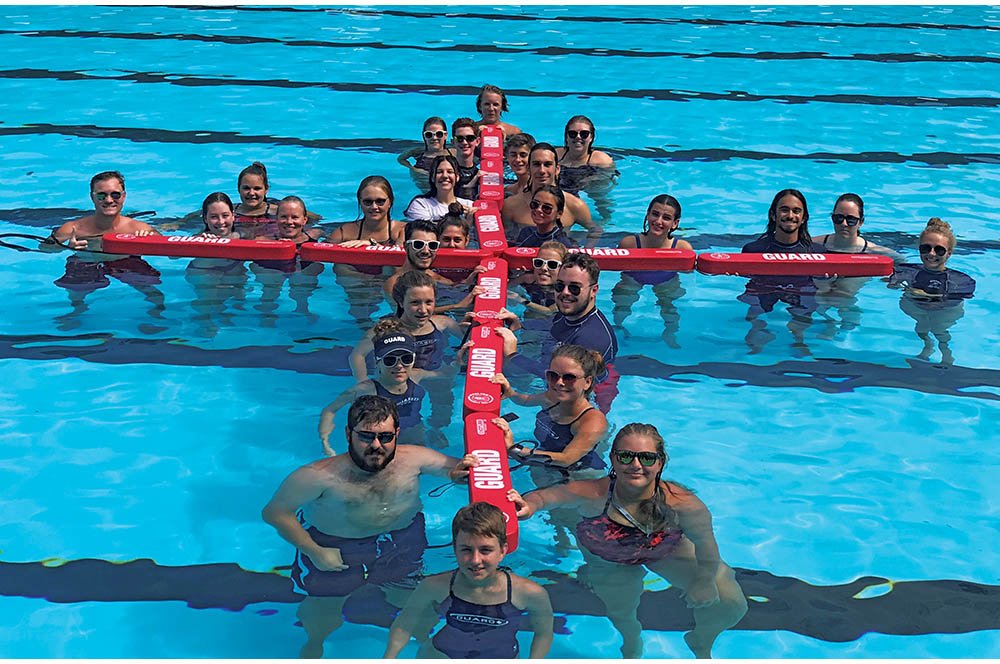Lifeguard Bootcamp
Gearing up for a successful aquatic season
By Terri Fisher and Jennifer Schmitt
Photos: Terri Fisher
“Tweet, tweet, tweet.” “Call 911.” “Grab me the backboard.” These are some of the sounds you’ll hear on the pool deck during the annual, preseason Lifeguard Bootcamp at Marine Corps Air Station Cherry Point in North Carolina.
For the past 14 years, prior to opening for Memorial Day weekend, Lifeguard Bootcamp has been operating from Monday through Friday with opening day on Saturday. Because the majority of staff members are students who have been busy with studies and extracurricular activities, that time was determined to be the best to get everyone’s head back in the game. It’s also a great opportunity to encourage the lifeguards, both new and returning, to train as a team, get to know each other, and learn to trust each other. Because there are three pools to operate—each one different—time is arranged to train at each facility. By Friday, which is also Administration Day, everyone is tired but operating like a well-oiled machine. Twenty hours of training ends with a big potluck dinner. Morale is at its peak, and when the pool opens the following day, everyone will receive their pay for all of the hard work. It doesn’t get any better than that!
Motivated Staff Members Required
The first step in setting up a days-long training venture is ensuring there are motivated and knowledgeable staff members ready to lead. At our facilities, management hosts a one-day training session for lifeguard supervisors prior to boot camp. This training is called Aquatics Leadership Retreat (ALR). Most attendees are supervisors whose job description requires them to attend, while other lifeguard instructors are invited based on their performance on the job, knowledge of lifesaving techniques, self-motivation, and attitude at work.
ALR begins by having participants become familiar again with Standard Operating Procedures (SOPs). An open discussion is held on how to improve or change any pool rules/regulations within the SOPs, based on previous experiences and/or new scientific information. Such discussions help develop a sense of ownership and pride. Next, each supervisor is assigned a topic to teach during boot camp week. He or she is responsible for planning, preparing, and presenting that topic for staff members. Management remains available for questions, concerns, and guidance related to the assigned topics, but the leaders are given full control over implementation.
Five Days Of Intense Training
Lifeguard Bootcamp is designed to be an intensive period of training skills. Participants run through numerous scenarios based on previous incidents, and cover the Emergency Response Plan (ERP) at each pool, which is also helpful in showing each pool’s differences and layout. Reviewed are play features and rescue requirements. Pool attendants also train with the lifeguards since they are an integral part of the safety team. If recertification is needed for that year, it is completed during boot camp. For cohesion and ease, all staff members are on the same lifeguard-certification validity cycle.
While the guards train ferociously, pool attendants gather around the point-of-sale (POS) system, where veteran pool attendants assist with cashier training. Handling money, with all of the paperwork involved, like swim tests, hold-harmless, and POS/deposit forms, are reviewed and explained at this time.
Topics Covered
Some topics covered during boot camp are Emergency Response Plans, CPR professional rescuer, first aid, passive- and active-victim rescues, water and land spinals, rotations, scanning, zone coverage, conditioning, teambuilding, whistle codes and blowing the whistle, emergency-equipment placement (at each pool), and pool-vacuum protocol. During Administration Day, topics reviewed include SOPs, pool rules, inclement weather protocol, time keeping, incident reports, swim test forms and administration of the tests, personal electronic policy, safety, the 500-yard swim (each time a guard works), customer service, inclusive recreation, cleaning duties (yes, lifeguards clean toilets!), and other pertinent information.
Adapt And Overcome
Whenever a big event like this is planned, there are bound to be a few issues. What’s important is to learn to adapt and overcome in order to accomplish the mission.
We have alternate sites available in case of inclement weather. We can move CPR and first aid indoors if needed. We’ve also been known to move Administration Day around because of some stormy weather. The one constant is always the potluck dinner on Friday night.
With one year-round indoor pool and two seasonal outdoor pools, one of the struggles during boot camp week is staff coverage at the indoor pool. Closing it is not an option, as it must remain open for Marines to utilize. To alleviate this problem, a few returning staff members are scheduled to cover the indoor pool.
It is difficult to have enough rescue and training equipment available for a large training session that involves 40 to 50 people. For this reason, we use round-robin activities, where lifeguard instructors lead different rescues at each corner of the pool and staff members go from group to group until all skills are complete. This also works if there are a limited number of mannequins. Adult CPR, infant CPR, and first aid can all be done in stations.
For additional information and discussion, please feel free to reach out. We would love to hear from you.
Terri Fisher is the Supervisory Recreation Specialist and Aquatics Director for the Marine Corps Air Station Cherry Point in North Carolina. Reach her at thersa.fisher@usmc-mccs.org.
Jennifer Schmitt is the Assistant Supervisory Recreation Specialist and Assistant Aquatics Manager. Reach her at jennifer.l.schmitt@usmc-mccs.org.


